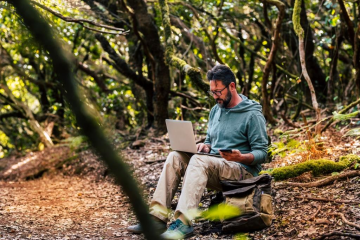The new digital nomads and work hospitality: from a dream for a few to a tourist trend to be understood and interpreted
By Maria Antonietta Tortola, Guest Magazineeditorial team
While our parents punched the clock for a lifetime, we aspired to do the same to secure our "pension" after years of subways, packed buses and grey desks, the only splash of colour provided by photos of our loved ones and flamboyant stationery. But our children - but not only them - have decided to do something very different in their professional and personal lives. Who among us has not dreamed of working on a heavenly beach or on a mountain top, admiring views that only Mother Nature can provide? Well, there are now categories of workers who can afford to do so: they are the digital nomads.
Who are the digital nomads?
They are remote workers, who instead of working from home, decide to do so either from a different country or by periodically moving to other destinations, trying to “reach” every part of the planet. This is a very specific career choice, which stems from a desire for freedom, experimentation, autonomy and the desire to express one's creativity in a different way. A digital nomad is someone who plans their life around these priorities, using technology and the internet to work exactly in the place they want to be at that moment.
How do you become a digital nomad?
In addition to having a particular predisposition (and a desire) to travel far and wide, you first need to analyse your own history and inclinations. Like: what can I do? What am I good at? Can I turn my passion into a job? Is there a market that might need my expertise? After all, a digital nomad is someone who may work from a beautiful beach, but still needs to earn money.
A new tourism business?
Beyond what digital nomads do, we need to focus on the fact that to all intents and purposes, this is a new tourism market. And not really one that can be identified as being part of the business market, because digital nomads, precisely given the choice they have made, are also very attentive to leisure. While working, they want to enjoy the destination they have chosen for that moment, to have experiences and, above all, to benefit from services in the hotel or accommodation facility they have chosen to stay in.
How can you attract this market?
The first keyword is undoubtedly Wi-Fi. We have had the opportunity (alas) to work remotely in all areas. And everywhere we found that the biggest limitation was that the internet connection was never great. All the more so when it comes to tourist facilities, Wi-Fi is the “cross” borne by many. So the first thing hotels that want to appeal to the digital nomad tourist market need to do is to ensure they have a stronger internet connection than the average accommodation facility. Preferably dedicated. Of course, these professionals are always equipped with network bridges, but accommodation facilities should adapt to their needs to be more competitive.
Marketing rooms and services must follow their own logic. Weekly, monthly or even yearly packages might be more appealing for working travellers. It may also be attractive to offer day-use or even hourly rates to those who only need to stay for a short time at a particular destination. So the second keyword is undoubtedly flexibility. Get it out of your head that digital nomads work all the time on the beach or in the woods. In fact, this is often not the case. Therefore, the services that a hotel can offer this type of clientele are of fundamental importance. Not only meeting rooms to meet possible clients or coworking spaces, but also services in rooms: a desk, an ergonomic chair and even a coffee machine with a few snacks can make a real difference.
Destinations must also play their part
As well as all this, we can add that destinations must also play their part. In fact, they have a great responsibility, which is to make it easier for digital nomads to move around, by issuing special visas, for example, but also by offering tax concessions.
Digital nomads, however, do not only aspire to work in the Maldives or Bali, so this market could also represent a great opportunity for smaller destinations. Provided they adapt to accommodate it, offering – where they don’t have a Caribbean beach – memorable travel and stay experiences.
Non-hotel vs traditional hotel
For a whole series of reasons, first and foremost price, non-hotel facilities are currently winning in the challenge against traditional hotels to secure this market segment. Also because they often have larger spaces – kitchens, for example – which give professionals even more freedom and also offer many other "amenities". However, what the non-hotel hospitality world needs to do is to train and professionalise itself more in order to meet the new challenges posed by tourism. An excellent opportunity in this regard is provided by Host B2B, the largest community in the non-hotel sector that organises training conferences at the highest level with the aim of professionalising sector operators.
In conclusion
At this point, we should ask ourselves: does it make sense for a hotel to invest to meet this specific demand? At present, there are around five million digital nomads, and the number continues to grow. So business volumes are not yet such that a hotel should "devote" itself exclusively to this type of market. However, devoting a small part of your company to digital nomads could have its advantages.








Sign-in with
Follow Hospitality through your socials and join your favourite events